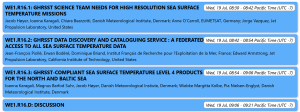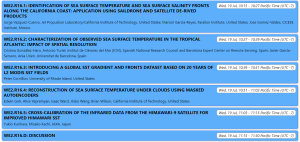GHRSST will be present at two sessions at IGARSS 2023, Pasadena, California, 16-23 July 2023
The International Geoscience and Remote Sensing Symposium (IGARSS) is the flagship conference of the IEEE Geoscience and Remote Sensing Society (GRSS).
Join the sessions and the discussions!
Session 1) Wed, 19 Jul, 08:30 – 09:45 Pacific Time (UTC -7) IGARSS Session WE1.R16 on 19 July 2023 “SST applications and the Group for High Resolution Sea Surface Temperature (GHRSST)”
Chair and co-chair: Ioanna Karagali (Danish Meteorological Institute) and Jorge Vazquez (NASA, JPL)
Link to the session: https://2023.ieeeigarss.org/view_session.php?SessionID=1426
Goal: The proposed session aims to communicate the achievements of the GHRSST community and reach out to new users of SST data.
Keywords: sea surface temperature, sea-ice surface temperature, infrared, microwave, high latitudes, coastal areas, diurnal variability, model assimilation
Sea surface temperature (SST) is a fundamental physical variable for understanding, quantifying and predicting complex interactions between the ocean and the atmosphere. Such processes determine how heat from the sun is redistributed across the global oceans, directly impacting large- and small-scale weather and climate patterns. The provision of daily maps of global SST for operational systems, climate modelling and the broader scientific community is now a mature and sustained service coordinated by the Group for High Resolution Sea Surface Temperature (GHRSST) and the CEOS SST Virtual Constellation (CEOS SST-VC).
The Group for High Resolution Sea Surface Temperature (GHRSST) is an open international science group that promotes the application of satellites for monitoring sea surface temperature (SST) by enabling SST data producers, users and scientists to collaborate within an agreed framework of best practices. GHRSST provides a framework for SST data sharing, best practices for data processing and a forum for scientific dialogue, bringing SST to the users. GHRSST is led by elected international experts: the GHRSST Science Team. The GHRSST Science Team coordinates the data production and related research. Continuous efforts to refine the GHRSST data management structures ensure a functional system that conforms to international directives and results in easy access and guidance for users.
Research and development continue to tackle problems such as instrument calibration, algorithm development, diurnal variability, derivation of high-quality skin and depth temperature, and at areas of specific interest such as high latitudes and coastal areas. Applications of SST contribute to all seven societal benefits, including Discovery; Ecosystem Health and Biodiversity; Climate Variability & Change; Water, Food, and Energy Security; Pollution and Human Health; Hazards and Maritime Safety; and the Blue Economy. The aim of this session is to foster communication between the GHRSST and broader SST user communities with a wide range of topics including products, algorithms and applications.

Session 2) Wed, 19 Jul, 10:15 – 11:30 Pacific Time (UTC -7) SST Applications and the Group for High Resolution Sea Surface Temperature (GHRSST) II
Chair and co-chair: Ioanna Karagali (Danish Meteorological Institute) and Jorge Vazquez (NASA, JPL)
Link to the session: https://2023.ieeeigarss.org/view_paper.php?PaperNum=4640
- Identification of sea surface temperature and sea surface salinity fronts along the California coast: Application using Saildrone and satellite de-rived products
- Characterization of observed sea surface temperature in the tropical Atlantic: impact of spatial resolution
- Introducing a global SST gradient and fronts dataset based on 20 years of l2 MODIS SST fields
- Reconstruction of Sea Surface Temperature Under Clouds Using Masked Autoencoders
- Cross-calibration of the infrared data from the HIMAWARI -9 satellite for improved HIMAWARI SST

IGARSS 2023: https://2023.ieeeigarss.org/index.php
